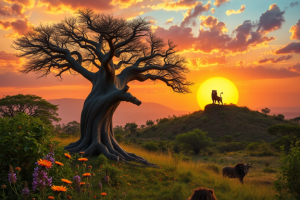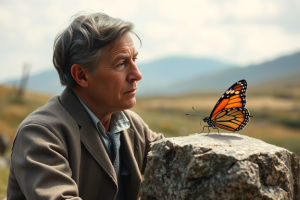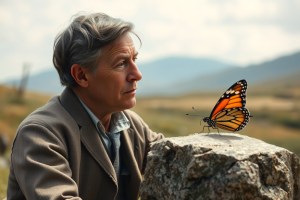
We are now at the beginning of the dry season in Ethiopia. Have you noticed the sharp rise in temperature even before the month of September expires? The unexpected heat is creating the strange impression that we are in the middle of the Ethiopian summer. It is unusually getting hotter during the day and warmer during the night. The transition is somehow abrupt and this may be an indication of the climatic change that is taking place in many countries around the world. In the older days, the rainy season was replaced by the sunny days quite slowly and the rains usually lasted until October.
Now, things are changing. The global climatic upheavals of the last few decades are making their impacts felt with the sharp rise in daytime as well as nightly temperatures. Human nature tends to be shifty as the climate. During the rainy season, people complain about too much rain and in the dry season they complain about an unusually hot temperature. However, nature tends to compensate us or to keep the balance by giving us happier days. Although cold and warm weathers change place there are also good times that come every year at the same time as if they have an appointment with destiny. The New Year Holiday, which comes at the end of the rainy season, is followed by Meskel, or the founding of the True cross, Irreechaa, or the Ethiopian Thanksgiving, and other holidays.
Thanksgiving Day has a long history and is celebrated differently in different cultures. Thanksgiving in many cultures, for instance in American culture, “evolved during the early decades of the 20th century. As football became increasingly popular in the 1920s and 1930s, many people began to enjoy the holiday at a football stadium. Teams in the National Football League eventually established the tradition of playing nationally televised games on Thanksgiving afternoon.” In Oromo culture, Irreechaa is a traditional holiday considered the equivalent of Thanksgiving.
In America and Canada, thanksgiving is part and parcel of the urban culture. It is celebrated with American football games, shopping and other activities. Irreechaa is rather a holiday celebrated in rural Oromia and is based on a traditional belief or practice to pay tribute to Waqaa or God, for bringing about the rainy season and the harvest that follows. Irreechaa is therefore a day that is observed to ‘give thanks’ to Waqaa. In other words, it is a celebration of water, that is to say, abundant rainfall and plenty of harvest. Thanksgiving is also celebrated in Canada in a way remotely resembling the one observed in Oromo culture.
“Thanksgiving is also a national holiday in Canada. Because Canada is north of the United States, its harvest comes earlier in the year. Accordingly, the Thanksgiving holiday falls earlier in Canada than in the United States. The Canadian Parliament set aside November 6 for annual Thanksgiving observances in 1879. In 1957 the date was shifted to an even earlier day, the second Monday in October.”
Irreechaa celebrations in big and small towns across Oromia usually look like huge wedding ceremonies that take place in public spaces. Residential houses, public places, businesses as well as government premises are usually decorated with slogans and banners praising Irreechaa as a big moment of peace, unity and love. The three magical words were also inscribed on many banners and stickers. They reflect the present political and social situation in the country where the calls for peace, love and unity have gained unprecedented attention.
Some of the business outlets start preparing for the big holiday weeks before the actual day. Owners of those outlets paint their premises and do some face-lifting work on their facades. They hang banners and flags along the streets and avenues. Although the slogans are written in many languages including Amharic, Afan Oromo and English. Their messages remain the same. They are peace, love and unity in whatever orders you put these three magical words. Peace is not more important than love or vice versa. Unity is not less important than peace. The three are mutually complimentary and equally important.
Nowadays, Irreechaa is first celebrated in the capital Addis Ababa as millions of people come from different small towns and villages around the capital. In the following day the same traditional holiday is observed in towns and villages located farther from the capital. In the old days, Irreechaa rituals used to take place at Lake Hora Arsedi some 50 km south of Addis Ababa.
Even though Irreechaa was celebrated in the town of Bishoftu, the heat is felt as far as Dukem and even in the small town of Gelan right on the outskirts of the capital. People travel to Bishoftu and then to Lake Hora a week or so before the actual day of celebrations. Some of them arrive either on the eve or on the very morning of the actual festivities. Millions of them converge on Bishoftu as they come from almost all parts of Oromia.
More than an estimated 80 per cent of residents of Sunshine Village in Bishoftu are young people. Irreechaa celebrations have a huge appeal to the youths of the village and settlements around it. The village is also famous for its bars restaurants and mini-markets, new hotel buildings and recreational facilities. On the eve of the festival of what we have called the ‘Ethiopian Thanksgiving’, almost all the young and older residents are dressed in special clothes that reflect the importance of the festival as well as the respect they have for their age-old traditions.
Almost all people in the main street are dressed in white, black and red clothes that represent the official colors of Oromia. Girls looked gorgeous in their fancy dresses and multicolored necklaces and beads that add esthetic dimension to their dresses. Young people in their twenties and even younger hold long sticks as they sang and danced to the tunes of Irreechaa traditional hymns or songs. Some of them are leaping into the air, performing difficult dance movements only young people can perform. Music is everywhere blasting from huge loudspeakers especially prepared for the occasion.
In hotels, restaurants and business outlets around Sunshine Village, hosts and waiters are usually busying themselves with the difficult tasks of serving numerous customers at the a given time. Irreechaa is always a good opportunity for the hotel business everywhere the festivals take place. Marry makers are drinking inside and outside the premises, savoring fresh draft beer as well as wines with which they wash down the foods they are eating.
Oromia towns are famous for their meat and beer joints. The number one choice among food lovers is of course raw meat, followed by roasted one and finely minced meat dishes mixed with butter, garlic and peppered with spices. They are mouthwatering even when their aromatic smells filled your nostrils.
While speaking of a big town like Bishoftu during Irreechaa celebrations, one cannot overlook the economic development and more particularly the expansion of hotel business in the town. Many high-class or luxurious hotels are built to accommodate not only local residents but also tourists and people who come on weekends for rest around the lakeside resorts and recreation centers.
Holidays like Irreechaa or the New Year are special occasions for the hotel that accommodates hundreds of guests in its rather larger premise where a water pool gives magnificent look to the whole place and add another dimension to its imposing structures.
During Irreechaa, all the hotels and restaurants are filled with guests and music is blaring from the loudspeakers. Small groups of youngsters travelled from one place to the other, performing the traditional Oromo dances and singing traditional songs in celebration of Irreechaa and the ideals for which it stands. These were the ideals of love, peace and unity, the three magic words that were on everyone’s lips.
Although there is usually plenty of foods and beverages during Irreechaa celebration, the occasion should also give food for some thoughts or reflections about the relation between national holidays and the potentials for promoting tourism in general. The Irreechaa festivals in Addis Ababa are so huge and so interesting that with proper media promotion and the participation by the relevant government agencies, they could be turned into rare opportunities for tourism activities.
Foreign tourists as well as Oromo nationals in the Diaspora could be invited to come to Addis for the Irreechaa celebrations so that the new generations would be acquainted with age of traditions of their ancestors. This could of course generate huge incomes for the hotel and tourism-related businesses. Addis Ababa in itself can be turned into a once-in-a-year tourist destination as it is one of the ten biggest cities of Africa selected for its historical and cultural importance.
This moment is particularly suitable for promoting the tourism industry in the Ethiopian capital that is now growing in all directions and offering traditional as well as modern serving both local and foreign tourists. The weather in Addis at this time of the year is ideal for tourists who are now stepping out of their summer. Good accommodations, good foods and good recreational opportunities are all available in Addis at this particular time of the year. The pertinent authorities and private sector tourism promoters could come together to work around a tourism promotion program related to the Irreechaa celebrations in Addis. This kind of regional or local tourism promotion can also be promoted in other regions such as in the south of the country where annual festivals are regular events
BY MULUGETA GUDETA
THE ETHIOPIAN HERALD WEDNESDAY 2 OCTOBER 2024




